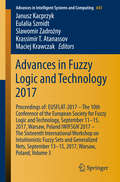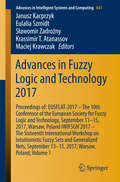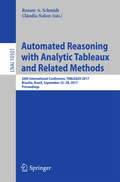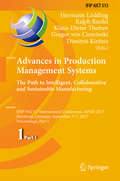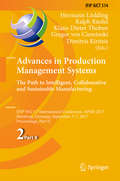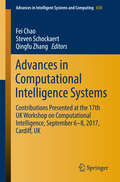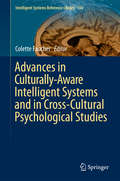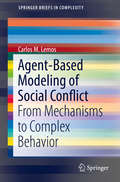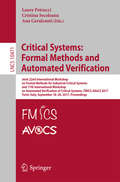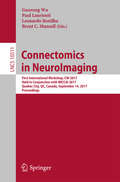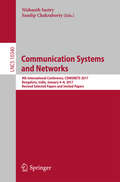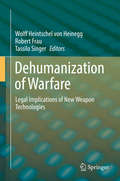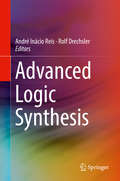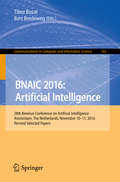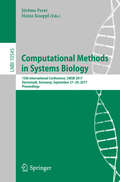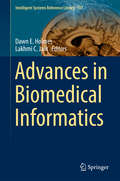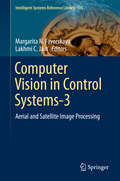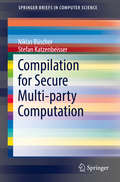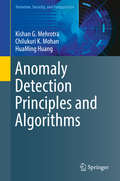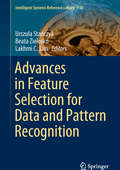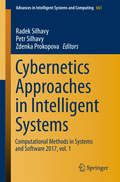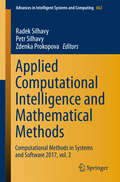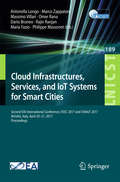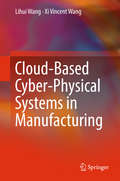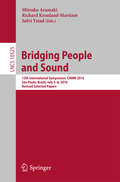- Table View
- List View
Advances in Fuzzy Logic and Technology 2017: Proceedings of: EUSFLAT- 2017 – The 10th Conference of the European Society for Fuzzy Logic and Technology, September 11-15, 2017, Warsaw, Poland IWIFSGN’2017 – The Sixteenth International Workshop on Intuitionistic Fuzzy Sets and Generalized Nets, September 13-15, 2017, Warsaw, Poland, Volume 3 (Advances in Intelligent Systems and Computing #643)
by Krassimir T. Atanassov Janusz Kacprzyk Maciej Krawczak Eulalia Szmidt Slawomir ZadrożnyThis volume constitutes the proceedings of two collocated international conferences: EUSFLAT-2017 - the 10th edition of the flagship Conference of the European Society for Fuzzy Logic and Technology held in Warsaw, Poland, on September 11-15, 2017, and IWIFSGN'2017 - The Sixteenth International Workshop on Intuitionistic Fuzzy Sets and Generalized Nets, held in Warsaw on September 13-15, 2017. The conferences were organized by the Systems Research Institute, Polish Academy of Sciences, Department IV of Engineering Sciences, Polish Academy of Sciences, and the Polish Operational and Systems Research Society in collaboration with the European Society for Fuzzy Logic and Technology (EUSFLAT), the Bulgarian Academy of Sciences and various European universities. The aim of the EUSFLAT-2017 was to bring together theoreticians and practitioners working on fuzzy logic, fuzzy systems, soft computing and related areas and to provide a platform for exchanging ideas and discussing the l atest trends and ideas, while the aim of IWIFSGN'2017 was to discuss new developments in extensions of the concept of a fuzzy set, such as an intuitionistic fuzzy set, as well as other concepts, like that of a generalized net. The papers included, written by leading international experts, as well as the special sessions and panel discussions contribute to the development the field, strengthen collaborations and intensify networking.
Advances in Fuzzy Logic and Technology 2017: Proceedings of: EUSFLAT-2017 – The 10th Conference of the European Society for Fuzzy Logic and Technology, September 11–15, 2017, Warsaw, Poland IWIFSGN’2017 – The Sixteenth International Workshop on Intuitionistic Fuzzy Sets and Generalized Nets, September 13–15, 2017, Warsaw, Poland, Volume 1 (Advances in Intelligent Systems and Computing #641)
by Krassimir T. Atanassov Janusz Kacprzyk Sławomir Zadrożny Maciej Krawczak Eulalia SzmidtThis volume constitutes the proceedings of two collocated international conferences: EUSFLAT-2017 - the 10th edition of the flagship Conference of the European Society for Fuzzy Logic and Technology held in Warsaw, Poland, on September 11-15, 2017, and IWIFSGN'2017 - The Sixteenth International Workshop on Intuitionistic Fuzzy Sets and Generalized Nets, held in Warsaw on September 13-15, 2017. The conferences were organized by the Systems Research Institute, Polish Academy of Sciences, Department IV of Engineering Sciences, Polish Academy of Sciences, and the Polish Operational and Systems Research Society in collaboration with the European Society for Fuzzy Logic and Technology (EUSFLAT), the Bulgarian Academy of Sciences and various European universities. The aim of the EUSFLAT-2017 was to bring together theoreticians and practitioners working on fuzzy logic, fuzzy systems, soft computing and related areas and to provide a platform for exchanging ideas and discussing the l atest trends and ideas, while the aim of IWIFSGN'2017 was to discuss new developments in extensions of the concept of a fuzzy set, such as an intuitionistic fuzzy set, as well as other concepts, like that of a generalized net. The papers included, written by leading international experts, as well as the special sessions and panel discussions contribute to the development the field, strengthen collaborations and intensify networking.
Automated Reasoning with Analytic Tableaux and Related Methods: 26th International Conference, TABLEAUX 2017, Brasília, Brazil, September 25–28, 2017, Proceedings (Lecture Notes in Computer Science #10501)
by Renate A. Schmidt Cláudia NalonThis book contains the proceedings of the 26th International Conference on Automated Reasoning with Analytics Tableaux and Related Methods, TABLEAUX 2017, held in Bras#65533;lia, Bazil, in September 2017. The 19 contributed papers presented in this volume were carefully reviewed and selected from 27 submissions. They are organized in topical sections named: Sequent systems; tableaux; transitive closure and cyclic proofs; formalization and complexity. Also included are papers of three invited speakers.
Advances in Production Management Systems. The Path to Intelligent, Collaborative and Sustainable Manufacturing: IFIP WG 5.7 International Conference, APMS 2017, Hamburg, Germany, September 3-7, 2017, Proceedings, Part I (IFIP Advances in Information and Communication Technology #513)
by Hermann Lödding Klaus-Dieter Thoben Dimitris Kiritsis Gregor Von Cieminski Ralph RiedelThe two-volume set IFIP AICT 513 and 514 constitutes the refereed proceedings of the International IFIP WG 5. 7 Conference on Advances in Production Management Systems, APMS 2017, held in Hamburg, Germany, in September 2017. The 121 revised full papers presented were carefully reviewed and selected from 163 submissions. They are organized in the following topical sections: smart manufacturing system characterization; product and asset life cycle management in smart factories of industry 4. 0; cyber-physical (IIoT) technology deployments in smart manufacturing systems; multi-disciplinary collaboration in the development of smart product-service solutions; sustainable human integration in cyber-physical systems: the operator 4. 0; intelligent diagnostics and maintenance solutions; operations planning, scheduling and control; supply chain design; production management in food supply chains; factory planning; industrial and other services; operations management in engineer-to-order manufacturing; gamification of complex systems design development; lean and green manufacturing; and eco-efficiency in manufacturing operations.
Advances in Production Management Systems. The Path to Intelligent, Collaborative and Sustainable Manufacturing: IFIP WG 5.7 International Conference, APMS 2017, Hamburg, Germany, September 3-7, 2017, Proceedings, Part II (IFIP Advances in Information and Communication Technology #514)
by Hermann Lödding Klaus-Dieter Thoben Dimitris Kiritsis Gregor Von Cieminski Ralph RiedelThe two-volume set IFIP AICT 513 and 514 constitutes the refereed proceedings of the International IFIP WG 5. 7 Conference on Advances in Production Management Systems, APMS 2017, held in Hamburg, Germany, in September 2017. The 121 revised full papers presented were carefully reviewed and selected from 163 submissions. They are organized in the following topical sections: smart manufacturing system characterization; product and asset life cycle management in smart factories of industry 4. 0; cyber-physical (IIoT) technology deployments in smart manufacturing systems; multi-disciplinary collaboration in the development of smart product-service solutions; sustainable human integration in cyber-physical systems: the operator 4. 0; intelligent diagnostics and maintenance solutions; operations planning, scheduling and control; supply chain design; production management in food supply chains; factory planning; industrial and other services; operations management in engineer-to-order manufacturing; gamification of complex systems design development; lean and green manufacturing; and eco-efficiency in manufacturing operations.
Advances in Computational Intelligence Systems: Contributions Presented at the 17th UK Workshop on Computational Intelligence, September 6-8, 2017, Cardiff, UK (Advances in Intelligent Systems and Computing #650)
by Steven Schockaert Fei Chao Qingfu ZhangThe book is a timely report on advanced methods and applications of computational intelligence systems. It covers a long list of interconnected research areas, such as fuzzy systems, neural networks, evolutionary computation, evolving systems and machine learning. The individual chapters are based on peer-reviewed contributions presented at the 17th Annual UK Workshop on Computational Intelligence, held on September 6-8, 2017, in Cardiff, UK. The book puts a special emphasis on novels methods and reports on their use in a wide range of applications areas, thus providing both academics and professionals with a comprehensive and timely overview of new trends in computational intelligence.
Advances in Culturally-Aware Intelligent Systems and in Cross-Cultural Psychological Studies (Intelligent Systems Reference Library #134)
by Colette FaucherThis book offers valuable new insights into the design of culturally-aware systems. In its first part, it is devoted to presenting selected Culturally-Aware Intelligent Systems devised in the field of Artificial Intelligence and its second part consists of two sub-parts that offer a source of inspiration for building modelizations of Culture and of its influence on the human mind and behavior, to be used in new Culturally-Aware Intelligent Systems. Those sub-parts present the results of experiments conducted in two fields that study Culture and its influence on the human mind's functions: Cultural Neuroscience and Cross-Cultural Psychology. In this era of globalization, people from different countries and cultures have the opportunity to interact directly or indirectly in a wide variety of contexts. Despite differences in their ways of thinking and reasoning, their behaviors, their values, lifestyles, customs and habits, languages, religions - in a word, their cultures - they must be able to collaborate on projects, to understand each other's views, to communicate in such a way that they don't offend each other, to anticipate the effects of their actions on others, and so on. As such, it is of primary importance to understand how culture affects people's mental activities, such as perception, interpretation, reasoning, emotion and behavior, in order to anticipate possible misunderstandings due to differences in handling the same situation, and to try and resolve them. Artificial Intelligence, and more specifically, the field of Intelligent Systems design, aims at building systems that mimic the behavior of human beings in order to complete tasks more efficiently than humans could by themselves. Consequently, in the last decade, experts and scholars in the field of Intelligent Systems have been increasingly tackling the notion of cultural awareness. A Culturally-Aware Intelligent System can be defined as a system where Culture-related or, more generally, socio-cultural information is modeled and used to design the human-machine interface, or to provide support with the task carried out by the system, be it reasoning, simulation or any other task involving cultural knowledge.
Agent-Based Modeling of Social Conflict: From Mechanisms to Complex Behavior (SpringerBriefs in Complexity)
by Carlos M. LemosThis Brief revisits and extends Epstein's classical agent-based model of civil violence by considering important mechanisms suggested by social conflict theories. Among them are: relative deprivation as generator of hardship, generalized vanishing of the risk perception ('massive fear loss') when the uprisings surpass a certain threshold, endogenous legitimacy feedback, and network influence effects represented by the mechanism of dispositional contagion. The model is explored in a set of computer experiments designed to provide insight on how mechanisms lead to increased complexity of the solutions. The results of the simulations are compared with statistical analyses of estimated size, duration and recurrence of large demonstrations and riots for eight African countries affected by the "Arab Spring," based on the Social Conflict Analysis Database. It is shown that the extensions to Epstein's model proposed herein lead to increased "generative capacity" of the agent-based model (i. e. a richer set of meaningful qualitative behaviors) as well the identification of key mechanisms and associated parameters with tipping points. The use of quantitative information (international indicators and statistical analyses of conflict events) allows the assessment of the plausibility of input parameter values and simulated results, and thus a better understanding of the model's strengths and limitations. The contributions of the present work for understanding how mechanisms of large scale conflict lead to complex behavior include a new form of the estimated arrest probability, a simple representation of political vs economic deprivation with a parameter which controls the `sensitivity' to value, endogenous legitimacy feedback, and the effect of network influences (due to small groups and "activists"). In addition, the analysis of the Social Conflict Analysis Database provided a quantitative description of the impact of the "Arab Spring" in several countries focused on complexity issues such as peaceful vs violent, spontaneous vs organized, and patterns of size, duration and recurrence of conflict events in this recent and important large-scale conflict process. This book will appeal to students and researchers working in these computational social science subfields.
Critical Systems: Joint 22nd International Workshop on Formal Methods for Industrial Critical Systems and 17th International Workshop on Automated Verification of Critical Systems, FMICS-AVoCS 2017, Turin, Italy, September 18–20, 2017, Proceedings (Lecture Notes in Computer Science #10471)
by Laure Petrucci Cristina Seceleanu Ana CavalcantiThis book constitutes the refereed proceedings of the Joint 22nd International Workshop on Formal Methods for Industrial Critical Systems and the 17th International Workshop on Automated Verification of Critical Systems, FMICS-AVoCS 2017, held in Turin, Italy, in September 2017. The 14 full papers presented together with one invited talk were carefully reviewed and selected from 30 submissions. They are organized in the following sections: Automated verification techniques; Testing and scheduling; Formal Methods for mobile and autonomous robots; and Modeling and analysis techniques.
Connectomics in NeuroImaging: First International Workshop, CNI 2017, Held in Conjunction with MICCAI 2017, Quebec City, QC, Canada, September 14, 2017, Proceedings (Lecture Notes in Computer Science #10511)
by Guorong Wu Brent C. Munsell Paul Laurienti Leonardo BonilhaThis book constitutes the refereed proceedings of the First International Workshop on Connectomics in NeuroImaging, CNI 2017, held in conjunction with MICCAI 2017 in Quebec City, Canada, in September 2017. The 19 full papers presented were carefully reviewed and selected from 26 submissions. The papers deal with new advancements in network construction, analysis, and visualization techniques in connectomics and their use in clinical diagnosis and group comparison studies as well as in various neuroimaging applications.
Communication Systems and Networks: 9th International Conference, COMSNETS 2017, Bengaluru, India, January 4–8, 2017, Revised Selected Papers and Invited Papers (Lecture Notes in Computer Science #10340)
by Nishanth Sastry Sandip ChakrabortyThis book constitutes the refereed post-conference proceedings of the 9th International Conference on Communication Systems and Networks, COMSNETS 2017, held in Bengaluru, India, in January 2017. The 9 invited and 10 selected best papers have been carefully reviewed and selected from 192 submissions. They cover various topics in networking and communications systems.
Dehumanization of Warfare: Legal Implications of New Weapon Technologies
by Wolff Heintschel von Heinegg Robert Frau Tassilo SingerThis book addresses the technological evolution of modern warfare due to unmanned systems and the growing capacity for cyberwarfare. The increasing involvement of unmanned means and methods of warfare can lead to a total removal of humans from the navigation, command and decision-making processes in the control of unmanned systems, and as such away from participation in hostilities - the "dehumanization of warfare. " This raises the question of whether and how today's law is suitable for governing the dehumanization of warfare effectively. Which rules are relevant? Do interpretations of relevant rules need to be reviewed or is further and adapted regulation necessary? Moreover, ethical reasoning and computer science developments also have to be taken into account in identifying problems. Adopting an interdisciplinary approach the book focuses primarily on international humanitarian law, with related ethics and computer science aspects included in the discussion and the analysis.
Advanced Logic Synthesis
by Rolf Drechsler André Inácio ReisThis book provides a single-source reference to the state-of-the-art in logic synthesis. Readers will benefit from the authors' expert perspectives on new technologies and logic synthesis, new data structures, big data and logic synthesis, and convergent logic synthesis. The authors describe techniques that will enable readers to take advantage of recent advances in big data techniques and frameworks in order to have better logic synthesis algorithms.
BNAIC 2016: 28th Benelux Conference on Artificial Intelligence, Amsterdam, The Netherlands, November 10-11, 2016, Revised Selected Papers (Communications in Computer and Information Science #765)
by Tibor Bosse Bert BredewegThis book contains a selection of the best papers that were presented at the 28th edition of the annual Benelux Conference on Artificial Intelligence, BNAIC 2016. The conference took place on November 10-11, 2016, in Hotel Casa 400 in Amsterdam. The conference was jointly organized by the University of Amsterdam and the Vrije Universiteit Amsterdam, under the auspices of the Benelux Association for Artificial Intelligence (BNVKI) and the Dutch Research School for Information and Knowledge Systems (SIKS). The objective of BNAIC is to promote and disseminate recent research developments in Artificial Intelligence, particularly within Belgium, Luxembourg and the Netherlands, although it does not exclude contributions from countries outside the Benelux. The 13 contributions presented in this volume (8 regular papers, 4 student papers, and 1 demonstration paper) were carefully reviewed and selected from 93 submissions. They address various aspects of Artificial Intelligence such as Natural Language Processing, Agent Technology, Game Theory, Problem Solving, Machine Learning, Human-Agent Interaction, AI & Education, and Data Analysis.
Computational Methods in Systems Biology: 15th International Conference, CMSB 2017, Darmstadt, Germany, September 27–29, 2017, Proceedings (Lecture Notes in Computer Science #10545)
by Heinz Koeppl Jérôme FeretThis book constitutes the refereed proceedings of the 15th International Conference on Computational Methods in Systems Biology, CMSB 2017, held in Darmstadt, Germany, in September 2017. The 15 full papers, 4 tool papers and 4 posters presented together with 1 invited talk were carefully reviewed and selected from 41 regular paper submissions. Topics of interest include formalisms for modeling biological processes; models and their biological applications; frameworks for model verication, validation, analysis, and simulation of biological systems; high-performance computational systems biology and parallel implementations; model inference from experimental data; model integration from biological databases; multi-scale modeling and analysis methods; and computational approaches for synthetic biology.
Advances in Biomedical Informatics (Intelligent Systems Reference Library #137)
by Lakhmi C. Jain Dawn E. HolmesThis book presents authoritative recent research on Biomedical Informatics, bringing together contributions from some of the most respected researchers in this field. Biomedical Informatics represents a growing area of interest and innovation in the management of health-related data, and is essential to the development of focused computational models. Outlining the direction of current research, the book will be of considerable interest to theoreticians and application scientists alike. Further, as all chapters are self-contained, it also provides a valuable sourcebook for graduate students.
Computer Vision in Control Systems-3: Aerial and Satellite Image Processing (Intelligent Systems Reference Library #135)
by Lakhmi C. Jain Margarita N. FavorskayaThe research book is a continuation of the authors' previous works, which are focused on recent advances in computer vision methodologies and technical solutions using conventional and intelligent paradigms. The book gathers selected contributions addressing aerial and satellite image processing and related fields. Topics covered include novel tensor and wave models, a new comparative morphology scheme, warping compensation in video stabilization, image deblurring based on physical processes of blur impacts, and a rapid and robust core structural verification algorithm for feature extraction in images and videos, among others. All chapters focus on practical implementations. Given the tremendous interest among researchers in the development and applications of computer vision paradigms in the field of business, engineering, medicine, security and aviation, this book offers a timely guide.
Compilation for Secure Multi-party Computation (SpringerBriefs in Computer Science)
by Stefan Katzenbeisser Niklas BüscherThis book presents a holistic view on compiler assisted practical secure multi-party computation (MPC) over Boolean circuits. It discusses that two or more parties jointly evaluate a function over their inputs in such a way that each party keeps its input unknown to the other parties in MPC. MPC provides a generic way to construct Privacy-Enhancing Technologies, which protect sensitive data during processing steps in untrusted environments. A major obstacle in the past was to generate MPC applications by hand. Recently, special compilers have been developed to build all kinds of applications. This book also explains in detail how efficient MPC applications can be created automatically from ANSI-C, thus, bridging the areas of cryptography, compilation and hardware synthesis. It also gives an insight into the requirements for creating efficient applications for MPC and is hence of interest to not only researchers in the area of MPC but also developers realizing practical applications with MPC. For a better understanding of the complete compile chain from ANSI-C to circuits, which is the 'machine code' of MPC, the authors first give the necessary background information on MPC protocols, Boolean logic, and logic synthesis. Then the authors describe the various compilation steps required to translate any code into an adequate circuit description. Afterwards, the authors introduce a variety of optimization techniques for two classes of MPC protocols, namely techniques that improve the runtime of applications in constant- and multi-round MPC protocols. The authors also illustrate how efficient parallelization of MPC protocols can be achieved using the assistance of compilers. It presents the effectiveness of the proposed techniques by giving a detailed evaluation on benchmarking applications. Most of the aforementioned techniques are implemented in our open source compiler that is accompanying this book and allows to study compilation for MPC in practice. Researchers who are interested in practical secure multi-party computation (MPC), and developers who are interested in realizing MPC applications in practice will find this book useful as a reference, as well as advanced-level students in computer science.
Anomaly Detection Principles and Algorithms (Terrorism, Security, and Computation)
by Chilukuri K. Mohan Kishan G. Mehrotra HuaMing HuangThis book provides a readable and elegant presentation of the principles of anomaly detection,providing an easy introduction for newcomers to the field. A large number of algorithms are succinctly described, along with a presentation of their strengths and weaknesses. The authors also cover algorithms that address different kinds of problems of interest with single and multiple time series data and multi-dimensional data. New ensemble anomaly detection algorithms are described, utilizing the benefits provided by diverse algorithms, each of which work well on some kinds of data. With advancements in technology and the extensive use of the internet as a medium for communications and commerce, there has been a tremendous increase in the threats faced by individuals and organizations from attackers and criminal entities. Variations in the observable behaviors of individuals (from others and from their own past behaviors) have been found to be useful in predicting potential problems of various kinds. Hence computer scientists and statisticians have been conducting research on automatically identifying anomalies in large datasets. This book will primarily target practitioners and researchers who are newcomers to the area of modern anomaly detection techniques. Advanced-level students in computer science will also find this book helpful with their studies.
Advances in Feature Selection for Data and Pattern Recognition (Intelligent Systems Reference Library #138)
by Lakhmi C. Jain Urszula Stańczyk Beata ZieloskoThis book presents recent developments and research trends in the field of feature selection for data and pattern recognition, highlighting a number of latest advances. The field of feature selection is evolving constantly, providing numerous new algorithms, new solutions, and new applications. Some of the advances presented focus on theoretical approaches, introducing novel propositions highlighting and discussing properties of objects, and analysing the intricacies of processes and bounds on computational complexity, while others are dedicated to the specific requirements of application domains or the particularities of tasks waiting to be solved or improved. Divided into four parts - nature and representation of data; ranking and exploration of features; image, shape, motion, and audio detection and recognition; decision support systems, it is of great interest to a large section of researchers including students, professors and practitioners.
Cybernetics Approaches in Intelligent Systems: Computational Methods in Systems and Software 2017, vol. 1 (Advances in Intelligent Systems and Computing #661)
by Radek Silhavy Petr Silhavy Zdenka ProkopovaThis book discusses new approaches and methods in the cybernetics, algorithms and software engineering in the scope of the intelligent systems. It brings new approaches and methods to real-world problems and exploratory research that describes novel approaches in the cybernetics, algorithms and software engineering in the scope of the intelligent systems. This book constitutes the refereed proceedings of the Computational Methods in Systems and Software 2017, a conference that provided an international forum for the discussion of the latest high-quality research results in all areas related to computational methods, statistics, cybernetics and software engineering.
Applied Computational Intelligence and Mathematical Methods: Computational Methods in Systems and Software 2017, vol. 2 (Advances in Intelligent Systems and Computing #662)
by Radek Silhavy Petr Silhavy Zdenka ProkopovaThe book discusses real-world problems and exploratory research in computational intelligence and mathematical models. It brings new approaches and methods to real-world problems and exploratory research that describes novel approaches in the mathematical methods, computational intelligence methods and software engineering in the scope of the intelligent systems. This book constitutes the refereed proceedings of the Computational Methods in Systems and Software 2017, a conference that provided an international forum for the discussion of the latest high-quality research results in all areas related to computational methods, statistics, cybernetics and software engineering.
Cloud Infrastructures, Services, and IoT Systems for Smart Cities: Second EAI International Conference, IISSC 2017 and CN4IoT 2017, Brindisi, Italy, April 20–21, 2017, Proceedings (Lecture Notes of the Institute for Computer Sciences, Social Informatics and Telecommunications Engineering #189)
by Dario Bruneo Omer Rana Maria Fazio Antonella Longo Marco Zappatore Massimo Villari Rajiv Ranjan Philippe MassonetThis book constitutes the proceedings of the Second International Conference on Cloud, Networking for IoT Systems, CN4IoT 2017, and the Second EAI International Conference on ICT Infrastructures and Services for Smart Cities, IISSC 2017, held in Brindisi, Italy, in April 2017. The 26 full papers of both conferences were selected from 39 submissions. CN4IoT presents research activities on the uniform management and operation related to software defined infrastructures, in particular by analyzing limits or advantages in solutions for Cloud Networking and IoT. IISSC papers focus on ICT infrastructures (technologies, models, frameworks) and services in cities and smart communities.
Cloud-Based Cyber-Physical Systems in Manufacturing
by Lihui Wang Xi Vincent WangThis book presents state-of-the-art research, challenges and solutions in the area of cloud-based cyber-physical systems (CPS) used in manufacturing. It provides a comprehensive review of the literature and an in-depth treatment of novel methodologies, algorithms and systems in the area of architecture design, cyber security, process planning, monitoring and control. The book features detailed descriptions of how to derive solutions in a cloud environment where physical machines can be supported by cyber decision systems when engaged in real operations. It presents a range of novel ideas and is characterized by a balanced approach in terms of scope vs. depth and theory vs. applications. It also takes into account the need to present intellectual challenges while appealing to a broad readership, including academic researchers, practicing engineers and managers, and graduate students. Dedicated to the topic of cloud-based CPS and its practical applications in manufacturing, this book benefits readers from all manufacturing sectors, from system design to lifecycle engineering and from process planning to machine control. It also helps readers to understand the present challenges and future research directions towards factories of the future, helping them to position themselves strategically for career development.
Bridging People and Sound: 12th International Symposium, CMMR 2016, São Paulo, Brazil, July 5–8, 2016, Revised Selected Papers (Lecture Notes in Computer Science #10525)
by Mitsuko Aramaki Richard Kronland-Martinet Sølvi YstadThis book constitutes the thoroughly refereed post-conference of the 12th International Symposium on Computer Music Modeling and Retrieval, CMMR 2016, held in S#65533;o Paulo, Brazil, in July 2016. The 22 full papers presented were carefully reviewed and selected from 40 submissions. This year's conference theme "Bridging People and Sound" aimed at encouraging contributions from artists and listeners on the one side and audio and music technology researchers on the other.
